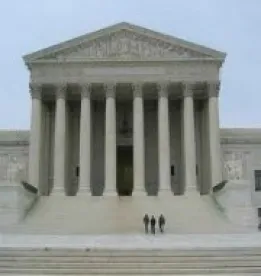In two recent decisions out of the D.C. Circuit Court of Appeals, the court reversed the National Labor Relations Board (NLRB or Board), finding that Board’s conclusion that the employers engaged in unfair labor practices in each case ignored simple realities, and instead restored the common sense balance between employees’ and employers’ rights with respect to protected concerted activity.
In the first decision, AT&T challenged an NLRB determination that its employees, even those interacting with customers in their homes, could wear disturbing, pro-union attire. The Communications Workers of America, which represents AT&T employees, produced t-shirts for its members. The front of the shirt said “Inmate #” and the reverse said “Prisoner of AT$T,” with several vertical stripes above and below the lettering such that the t-shirts resembled prison inmate jumpsuits. The union encouraged all employees, including those who install and repair lines at residences and businesses, to wear the shirts. AT&T banned the practice, claiming that the t-shirts violated its professional attire policy, could reasonably jeopardize the Company’s reputation, and could alarm customers (particularly in light of a recent highly-publicized home invasion in the area resulting in three murders). AT&T issued one-day suspensions to 183 employees who did not comply with Company rules not to wear the offending t-shirts.
The NLRB held that AT&T committed an unfair labor practice by banning the t-shirts. The D.C. Circuit rejected this conclusion, specifically citing “common sense” as one basis for its ruling. While noting that Section 7 of the National Labor Relations Act protects the right of employees to wear union apparel, the Court observed that there is a “special circumstances” exception to the general rule by which a company may lawfully prohibit its employees from displaying messages on the job that it reasonably believes may harm its relationship with its customers or its public image. As no reasonable company would want its employees walking into people’s homes wearing shirts that say “Inmate” and “Prisoner,” the Court held that the exception applied, and AT&T had not engaged in an unfair labor practice.
The second decision involved a 1,000-person protest incident to the construction of the famed Venetian resort in Las Vegas. A battle between the Venetian and two labor unions culminated with a demonstration on a small temporary walkway in front of the Venetian. The hotel loudly broadcast over the public address system that the demonstrators were subject to arrest, and security guards placed the demonstration’s leader under citizen’s arrest. The hotel also asked police officers at the demonstration to issue criminal citations to the demonstrators and block them from the temporary walkway.
In a prior decision, the NLRB decided – and the D.C. Circuit affirmed – that the public address system message and the citizen’s arrest violated Section 7 of the Act. The only issue in this second trip through the courts thus was whether the Venetian’s request that the police cite the demonstrators also ran afoul of the Act. The D.C. Circuit concluded that the Venetian’s request to police to cite demonstrators qualified as a constitutionally-protected direct petition to government. Under a line of cases known as the Noerr-Pennington doctrine, employer conduct that would otherwise be illegal may be protected by the First Amendment when it is part of a direct petition to government. The D.C. Circuit held that the act of summoning the police to enforce state trespass law is a direct petition to government subject to Noerr-Pennington protection.
The decision, like the AT&T ruling, is a narrow one. Employers should continue to exercise caution in trying to restrict employee demonstrations of union support. But the decisions together prove that employers need not tolerate offensive imagery that threatens customer relations, nor refrain from seeking police intervention to maintain civil order, in an effort to comply with Section 7.




 />i
/>i

